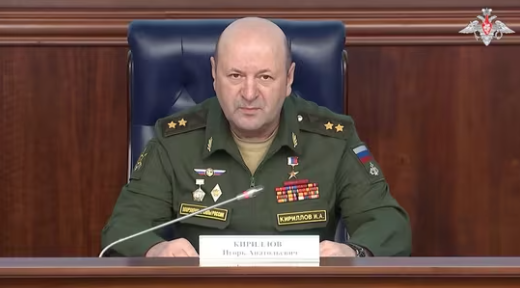In a significant escalation of hostilities between Ukraine and Russia, Ukraine’s Security Service (SBU) has reportedly claimed responsibility for a bomb blast that killed Lieutenant General Igor Kirillov, the chief of Russia’s nuclear, biological, and chemical protection forces. The incident occurred on Tuesday when a bomb hidden in a scooter detonated as Kirillov was leaving his apartment in Moscow for work. Tragically, his assistant also lost his life in the attack.
Kirillov, a prominent figure in Russia’s military hierarchy, had been under international sanctions due to his involvement in the ongoing conflict in Ukraine. The SBU had launched a criminal investigation against him just a day before his death, accusing him of orchestrating the use of banned chemical weapons against Ukrainian forces. An anonymous official from the SBU labeled Kirillov a “war criminal” and described him as a legitimate target, reflecting Ukraine’s intensified efforts to hold Russian officials accountable for their actions during the war.
According to reports, the SBU documented over 4,800 instances where Russia allegedly deployed chemical weapons in the ongoing conflict since the invasion began in February 2022. The U.S. State Department corroborated these claims earlier this year, citing the use of chloropicrin, a toxic gas originally utilized in World War I, against Ukrainian troops. Despite this, Russian officials have consistently denied any use of chemical weapons, instead accusing Ukraine of employing toxic agents in its military operations.
As the investigation into Kirillov’s death continues, Russia’s top investigative agency has classified the incident as a case of terrorism. Dmitry Medvedev, deputy head of Russia’s Security Council, claimed the attack was an attempt by Kyiv to distract its citizens from military failures and vowed retribution against Ukraine’s military-political leadership.
The tensions between Russia and Ukraine have only intensified in recent months, with each side accusing the other of escalating violence in the conflict. As Ukraine continues to seek NATO support, Russia remains steadfast in its commitment to its military objectives, setting the stage for an unpredictable future as the war shows no signs of abating.
This incident underscores the volatile nature of the conflict, highlighting the lengths to which both sides are willing to go in their efforts to assert dominance and achieve their military goals. With Kirillov’s death, the stakes have been raised, and the international community watches closely as the situation develops.








 India
India












